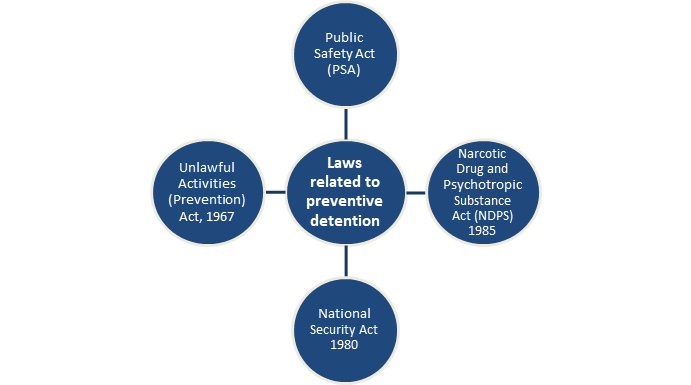Preventive and punitive detention
| Aspect | Preventive detention | Punitive detention |
|---|---|---|
| Purpose | Preventing an individual from committing a potential offense or acting in a manner harmful to public order or national security. | Imposed as a punishment for a crime that has already been committed. |
| Nature | It is based on the suspicion or apprehension of future misconduct. | It requires proof of guilt and adherence to legal procedures. |
| Legal Basis in India | • Governed by Article 22(3)-(7) of the Indian Constitution. • Allows preventive detention laws, such as: o National Security Act (NSA), 1980 o Maintenance of Internal Security Act (MISA) (now repealed) | • Governed by general criminal laws like the Indian Penal Code (IPC) and procedural laws like the Code of Criminal Procedure (CrPC). • Requires a trial and adherence to principles of natural justice. |
Preventive detention
-
- Safeguards: Article 22(4) and (5) provides for certain safeguards to protect the rights of people by ensuring:
- Preventive detention period of maximum 3 months, extendable only on approval of an Advisory Board (headed by a High Court judge).
- Detainee has the right to know the grounds of detention.
- Detainee can challenge his/her detention.
- Grounds: Article 22(6) and (7) provides that parliament can take away these safeguards on the following grounds:
- Security
- Public order
- Foreign affairs
- Essential services etc.
- Safeguards: Article 22(4) and (5) provides for certain safeguards to protect the rights of people by ensuring:

Related cases:
-
- Shibban Lal vs State of Uttar Pradesh Case (1954) – Limited intervention of courts in preventive detention cases.
- Nand Lal Bajaj vs State of Punjab and Anr Case (1981) – Preventive detention laws inconsistent with principles of parliamentary system.
- Rekha vs State of Tamil Nadu Case (2011) – Preventive detention “repugnant to democratic ideas”.
- Mariappan vs the District Collector and Others Case (2014) – Preventive detention to prevent harm to state, not to punish.
- Prem Narayan vs Union of India Case (2019) – Preventive detention infringement on personal freedom of individual and so cannot be casually.
- Abhayraj Gupta vs Superintendent, Central Jail, Bareilly Case (2021) – Preventive detention cannot be used when already detained.
- Jaseela Shaji vs Union of India case (2024) – SC reiterates rights of detained person in preventive detention cases.
Issues
-
- Undemocratic: No other democratic country has preventive detention as an integral part of the Constitution like in India.
- Misuse of acts: The acts like UAPA, NSA are been misused. According to an Indian Express Report, Allahabad HC quashed 78% of the detention orders between 2018-20.
- Ambiguous grounds: This results in prolonged and arbitrary detention. For example- In UP, detentions under NSA on allegations of cow slaughter.
- Recently, SC declared detention order of YouTuber Savukku Sankar absurd, non-reasoned and blatantly illegal.
- Lack checks and balances: Limited judicial oversight create risk for misuse of authority like improper functioning of Advisory Boards.
Way forward
-
- Advisory Board must play an active role and not as mere a rubber stamping authority.
- Maintain a balance between human rights and security of the nation.
- Differentiate between law and order and public order. (Ram Manohar Lohia vs State of Bihar Case, 1965)




